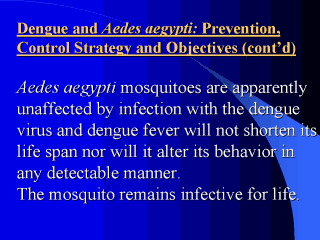 |
However, environmental hazards can
determine whether Aedes aegypti will survive long enough to pass-on the dengue
virus it carries. Secondary exposure to a different serotype may place the patient at risk
for more serious forms of infection, dengue hemorrhagic fever or dengue shock syndrome.
The life span of Aedes aegypti, the primary vector of dengue fever is usually 21
days, although life span and incubation periods depend on temperature and rainfall. The
presence of the vector, the rapid spread of the virus, and the increased occurrence of
natural disasters will contribute to the possibility of future dengue transmission in this
region. An early warning system based on immunoglobulin (Ig)M antibody-capture
enzyme-linked immunosorbent assay (MAC-ELISA) laboratory tests should be recommended for
disease monitoring. Active surveillance, an essential component of an early warning system
for detection of dengue, provides information vital to defining epidemiologic aspects of
cases and enabling educational and mosquito control efforts. |
